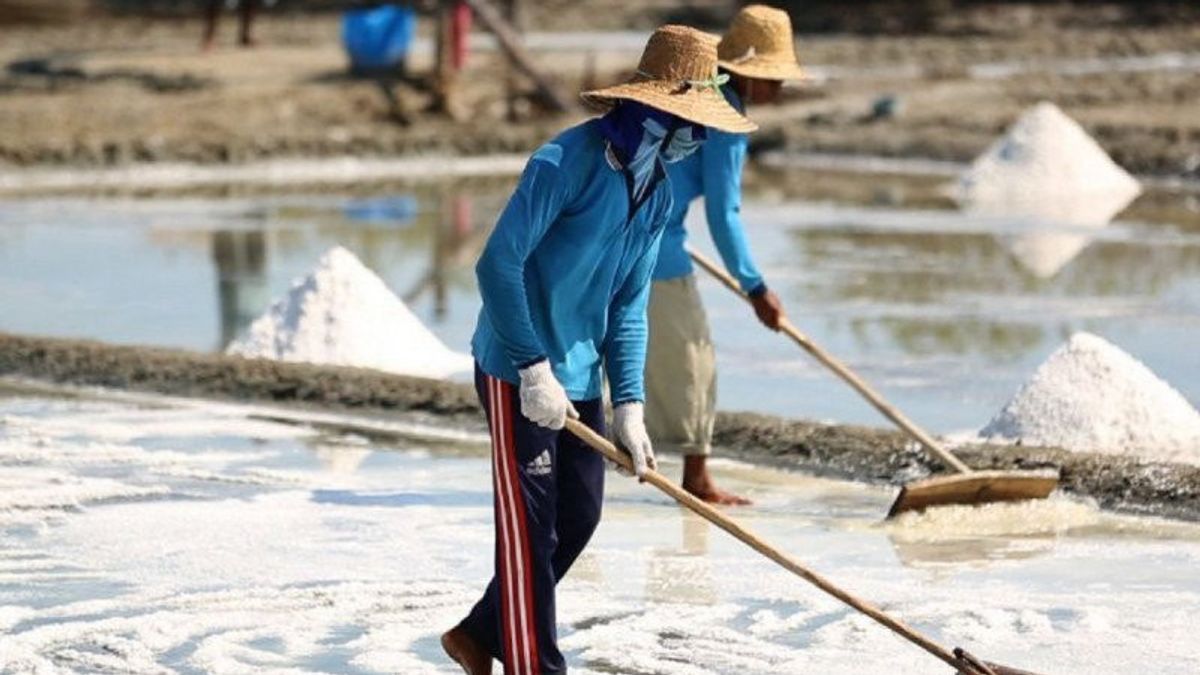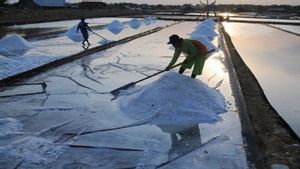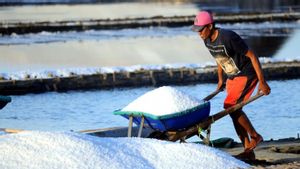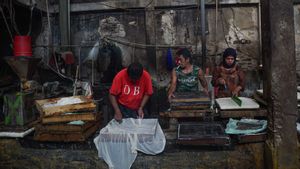JAKARTA - Indonesia is targeting self-sufficiency in salt by 2025. However, this is only a discourse so far. Because in fact, Indonesia still depends on imported salt. In fact, the realization of Indonesia's salt imports throughout 2020 reached 2.61 million.
The Central Statistics Agency (BPS) during January-February 2021, Indonesia was recorded as still importing salt with a volume of up to 80.2 thousand tons or the equivalent of USD 2.61 million. This realization was greater than the realization of imports from January to February 2020 which reached 123.76 thousand tons.
Meanwhile, the countries that Indonesia is importing salt from are Australia, China, India, Thailand, and New Zealand.
However, it seems that Indonesia will not be able to be free from importing salt in the near future. This is because the government has decided this year to import salt again.
Minister of Maritime Affairs and Fisheries, Sakti Wahyu Trenggono said that the import decision was in accordance with the results of a coordination meeting at the Coordinating Ministry for Maritime Affairs and Investment led by Luhut Binsar Pandjaitan.
"The salt import has been decided through a meeting of the Coordinating Minister for Maritime Affairs and Investment", said Minister Trenggono in Indramayu, Sunday, March 14.
Currently, Trenggono said, the government is still waiting for data related to salt demand in Indonesia because when a shortage is found, it will be imported.
According to Trenggono, salt imports are also carried out in accordance with the trade balance, so that domestic salt needs can be met.
"For example, how many shortcomings can it be imported, we are waiting for it. Because it is included in the work copyright law", he said.
The government does not learn from experience
A researcher at the UGM (Gadjah Mada University) Center for Populist Economic Studies (Pustek), Puthut Indroyono, regretted the government's policy plan to open imports of salt. According to him, this plan shows that the government does not yet have a clear national salt industry development design.
According to Puthut, the current government tends to adopt an import policy by only responding to trends in market demand, on the other hand, the government does not look at the medium and long-term national salt industry development strategy.
In fact, continued Puthut, the policies taken tend to be reactive in the short term and not constructive.
Puthut said that this kind of import policy keeps on repeating itself. According to him, the government has never learned from previous experiences.
"Every time the government opens salt imports, there is always no certainty that the same policy will not be implemented next year", he said, quoted from the official UGM website, Wednesday, March 17.

Puthut said the government should have valid data about the need for salt and pay attention to the welfare of salt farmers. The amount of salt needed every year should have predicted the tonnage. So that there is a target of reducing imports from year to year, followed by domestic production policy targets.
"If this is done in the next few years, salt self-sufficiency can be achieved", he said.
However, Puthut said, if until now the government did not have a clear national salt development policy design, then the issue of salt import policy would continue to recur.
Puthut said the COVID-19 pandemic had an impact on obstacles in the process of shipping export-import products. Therefore, he said, it should be used as momentum to increase national salt production in a more comprehensive and measurable manner and involve salt producer farmers.
Apart from that, according to him, the government also needs to improve the salt trading system in favor of salt farmers and the domestic industry.
[/ read_more]
"What I see, so far, it has not been seen from the government's policy regarding salt industrialization. In fact, the issue of data has always been raised between one agency and another. If data problems are still problematic, no understanding, how are we going to think about the strategy and development of salt production in the future?", he said.
The government cannot take advantage of the long potential of Indonesia's coast
Member of Commission IV of the House of Representatives (DPR), Ema Umiyyatul Chusnah, said that the plan to open a salt import tap is a concrete form of the government's failure to increase the potential for national salt.
In fact, said Ema, Indonesia has a coastline of 95.181 kilometers (km) and is the second-longest coastline in the world. However, apparently, it cannot be used to meet domestic salt needs.
"And (the government) chooses to import salt to countries with coastlines that are much shorter than this country", she said, in a written statement received by VOI, Monday, March 15.
Ema said that the relevant ministries such as the Ministry of Maritime Affairs and Fisheries (KKP) should be able to cooperate with other ministries such as the Ministry of State-Owned Enterprises (BUMN) to maximize state-owned companies in the food sector to increase salt production.
"However, currently, there seems to be no coordination, which makes Indonesia's potential to fulfill its own salt needs not being realized. In 2019 and 2020, the government imported 2.75 million tons and 2.92 million tons of salt. And this number does not appear to be much different this year", she explained.
The reason Indonesia is still importing salt, according to Jokowi
Ema said that it is not only the amount that is the problem of national salt production, but also the quality, which is considered to be still below standard so that it is one of the reasons for imports.
Furthermore, Ema said that the problem that had occurred for years should have had a solution.
"Related SOEs, such as PT Garam, clearly have to carry out their functions optimally. But unfortunately, the performance of PT Garam is not optimal and even below the standard. In fact, many of its assets are not maximized properly", she said.
Previously, President Joko Widodo (Jokowi) revealed the reasons why Indonesia should continue to import salt, despite having large natural resources. One of the reasons is because the national salt industry has not yet optimized its production capacity.

"Our national salt production is still low, so the easiest thing to look for is importing salt. It has always been there and there has never been a solution", said Jokowi, some time ago.
Therefore, optimizing production is the main homework for Indonesia. Jokowi assessed that a large-scale improvement in the commodity industry is needed, from upstream to downstream.
The former governor of DKI Jakarta also gave instructions to his assistants to take three steps. First, look again at the availability of salt production land.
Second, accelerate integration between efforts to extend the people's salt land in 10 provinces with intensification efforts.
Finally, Jokowi asked for assistance for salt farmers to improve the quality of their production.
SEE ALSO:
[/ read_more]
The English, Chinese, Japanese, Arabic, and French versions are automatically generated by the AI. So there may still be inaccuracies in translating, please always see Indonesian as our main language. (system supported by DigitalSiber.id)












